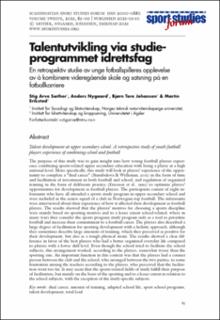| dc.description.abstract | The purpose of this study was to gain insight into how young football players experience combining sports-related upper secondary education with being a player at a high national level. More specifically, this study will look at players’ experience of the opportunity to complete a “dual career” (Stambulova & Wylleman, 2015) in the form of time and facilitation of investment in both football and school, and regulation of organized training in the form of deliberate practice (Ericsson et al., 1993) to optimize players’ opportunities for development as football players. The participants consist of eight informants who have all attended a sports study program in upper secondary school and were included in the senior squad of a club in Norwegian top football. The informants were interviewed about their experience of how it affected their development as football players. The results showed that the players’ motives for choosing a sports discipline were mainly based on sporting motives and to a lesser extent school-related, where in many ways they consider the sports program study program only as a tool to prioritize football and increase their commitment to a football career. The players also described a large degree of facilitation for sporting development with a holistic approach, although they sometimes describe large amounts of training, which they perceived as positive for their development, but also as a tough physical strain. The results showed a clear difference in favor of the best players who had a better organized everyday life compared to players with a lower skill level. Even though the school tried to facilitate the school subjects, this arrangement worked, according to the players, somewhat worse than the sporting one. An important function in this context was that the players had a contact person between the club and the school, who arranged between the two parties, to some frustration among the teachers according to the players, who perceived that the facilitation went too far. It may seem that the sports-related fields of study fulfill their purpose of facilitation, but mainly on the basis of the sporting and to a lesser extent in relation to the school subjects, with the exception of the study-specific subjects. | en_US |
